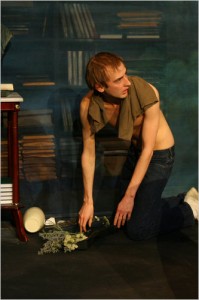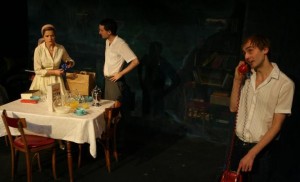MEANWHILE, ACROSS THE POND,
DURING THE McCARTHY ERA
When John Osborne and the lesser-known playwright/actor Anthony Creighton wrote Personal Enemy in 1953, it would have been courageous for someone living in the U.S. to caricature anti-communists as grotesque, proudly ignorant, anti-intellectual yahoos – it wouldn’t have been thoughtful or artistically interesting, but it would have been courageous. However, Osborne and Creighton were living in the U.K., where the Communist Party of Great Britain was not only free from persecution, but influential. Still, in order to be performed, the play had to be heavily expurgated by the Lord Chamberlain – Britain’s official censor (the U.K. tolerated communism, but not artistic freedom). According to the program notes, many of the cuts had to do with homosexuality; the notes make no reference to political objections.
At the height of McCarthyism’s tyranny, even Brits could be forgiven for simplistic attacks on American red-baiters. Though we are living through a resurgence of tarring people with the communist brush and of proud anti-intellectualism, since the 1950s we have seen attacks on American reactionaries stretching from Lenny Bruce to All in the Family and beyond. Caricatures like Archie Bunker and M.A.S.H’s Frank Burns are now passé.
The play’s impetus is the real-life defection of 22 American P.O.W.s to North Korea. In Personal Enemy, among them is Don Constant, who had been believed dead. When he lived at home, Don was friends with the high school librarian Ward Perry (Steven Clarke), who is suspected of being both a homosexual and a Communist. Perry had given Don a copy of Whitman’s Leaves of Grass inscribed “With love, Ward.” Don’s sister Caryl (Joanne King) and her husband Sam (Mark Oosterveen) discover that Perry, now the town librarian, has given the same book with the same inscription to the younger Constant son Arnie (Peter Clapp). When Don’s and Arnie’s mother (Karen Lewis), who has criticized Caryl for her intolerance, learns of her son’s defection, she becomes stridently anti-communist and calls Perry to the house for an inquisition and insists that he break off all contact with Arnie.
 The play’s reactionaries Caryl, the town minister (Clarke), an FBI agent (also Clarke), and ultimately Mrs. Constant are no more than straw men who inanely conflate intellectual interests, homosexuality, and communism. One of Osborne’s and Creighton’s ideas is inane as well as sexist and downright bizarre. When Sam finally stands up to Caryl’s narrow-minded fanaticism, he claims that America’s intolerance and conformism comes not from men like Joe McCarthy and Richard Nixon, but from emasculating, puritanical women whispering in their ears.
The play’s reactionaries Caryl, the town minister (Clarke), an FBI agent (also Clarke), and ultimately Mrs. Constant are no more than straw men who inanely conflate intellectual interests, homosexuality, and communism. One of Osborne’s and Creighton’s ideas is inane as well as sexist and downright bizarre. When Sam finally stands up to Caryl’s narrow-minded fanaticism, he claims that America’s intolerance and conformism comes not from men like Joe McCarthy and Richard Nixon, but from emasculating, puritanical women whispering in their ears.
This simplistic play is not made any better by director David Aula and his design team’s production for the Fallout Theatre. On the one hand, both the script’s depiction of Arnie as in love with the natural beauty of the fictional town of Langley Springs and Aula’s decision to start the play with Arnie watching Uncle Remus sing “Zippity-Dooh-Dah” on T.V. suggest that the setting should be a cheerful one into which suspicion intrudes. Yet designer Anna Hourriere’s set is oppressively dark. This seems not to be the result of a deliberate choice, but of an inability to make the most of limited resources. The Constant home is furnished with what look like dingily painted bookcases from an acting class’s prop collection. When Perry comes over, Aula ham-handedly has Mrs. Constant and Caryl set up the table as a witness stand for Perry and line three chairs up like the seats on a judicial bench. Elsewhere, Aula and Hourierree gratuitously allude to the Korean War with sandbags strewn about the periphery of the stage and a scrim on which mountains are painted in an Asian style.
Hourriere’s costumes are not as problematic as her set, but she does have Perry wear purple and white, two-tone, polka-dotted wingtip shoes that not even the swishiest hairdresser from a 1970s sitcom would wear.
The acting is hampered by the inability of many of the British cast to do American accents. Lewis, King, and Clarke have all opted for Southern accents, Turner and Oosterveen use standard American, and Clapp is from some part of the States with which I am unfamiliar. Several of the actors, to varying degrees, slip into their native British accents. If only one actor were having such problems, that could indicate his or her inability to learn an American accent; but when no less than four sound implausible, accent coach Sally Hague has not done her job.
Turner, King, and Oosterveen all give strong performances. King makes Caryl’s self-righteous bigotry viscerally infuriating, and Oosterveen’s challenge to her is moving (I wanted to stand up and cheer, “You tell her, man!”) Clarke exacerbates the cartoonishness of his jingoistic minister and G-man – the minister is a Southern evangelical from Central Casting. Clarke is adequate as Perry, as are Lewis and Clapp in their roles. Genevieve Allenberry is over-the-top as a Polish immigrant neighbor.
Osborne and Creighton’s Personal Enemy may not have seemed as grossly simplistic had it been performed uncensored in the 1950s, but alas, it has missed its time, and the Fallout Theatre has done neither the world nor the playwrights any favors by resurrecting it.
photos by Ari Mintz
Personal Enemy
part of Brits Off Broadway
59E59 Theaters
ends on November 28, 2010
for tickets, visit 59E59



{ 1 comment… read it below or add one }
“where the Communist Party of Great Britain was not only free from persecution”
What a crock of shit. You say that as if the Communists weren’t themselves persecuting and mass-murdering people all around the globe. Yu want to talk “anti-intellectual”, why don’t you talk about what Stalin was doing to the “brain workers” in this same timeframe.